Kratom, a plant native to Southeast Asia, has been gaining popularity across the United States, including in West Virginia. Known for its pain-relieving and mood-enhancing properties, Kratom is used by many as a natural alternative to traditional medications. This blog post will explore Kratom use in West Virginia, discuss its legal status, and consider both the benefits and concerns surrounding its use. Whether you’re curious about trying Kratom or just want to learn more about it, this guide will provide you with a well-rounded understanding of its impact in the Mountain State.
What is Kratom?
Kratom (scientific name Mitragyna speciosa) is a tropical tree native to Southeast Asia. Its leaves have compounds that produce mind-altering effects. Now that kratom is rising in popularity, its leaves are also used as a recreational drug. Kratom is considered a new dietary ingredient by the Federal Food, Drug, and Cosmetic Act, since the U.S. hadn’t marketed it as such before October 15, 1994. There’s been an upsurge in kratom use since 2000 in North America and Europe for recreational purposes and as a reliever of opioid withdrawal symptoms.

Until 2018, kratom was used in Thailand as an herbal remedy for hundreds of years. Now it may only be used for medical use; it’s otherwise banned in the country.
Even though kratom is legal in the U.S., it isn’t in several European countries, as well as Malaysia, Thailand, and Australia. This is likely because of the plant’s potential for addiction, as well as negative kratom side effects that affect both the mind and body. The Food and Drug Administration (FDA) has also banned any importing of kratom into the U.S., and the Drug Enforcement Administration (DEA) can currently seize kratom in any form other than as a leaf.
Relatively unheard of in the U.S., the evergreen kratom tree is a member of the coffee family. It’s considered a form of holistic medicine, which focuses on healing the spirit, mind, and body. Many vitamin and health stores will recommend kratom leaves as a source of pleasure and happiness. Despite these recommendations, doctors have heavily denied that kratom is good for you.
How is Kratom Used?
Kratom is legally sold in leaf or green/brown powder forms, some of which contain extracts from other plants. It’s also sold as gum or an extract. Even though kratom packages will say they’re not edible, people will take kratom in these forms as a recreational drug. Here’s a breakdown of how people typically use Kratom in West Virginia:
- Tea: One of the most common methods is brewing the leaves or powder into a tea. This involves simmering Kratom with water for a period of time to extract its compounds. Users often add honey, lemon, or other flavor enhancers to improve the taste.
- Powder: Kratom leaves are dried and ground into a powder that can be consumed directly. The powder can be mixed with water, juice, or smoothies. Some people also use the toss and wash method, where they take a spoonful of powder, place it in the mouth, and wash it down with a liquid.
- Capsules: For those who dislike the taste of Kratom or prefer a convenient method, capsules are available. These contain pre-measured amounts of Kratom powder and are taken like any other pill.
- Tinctures and Extracts: These are concentrated forms of Kratom that involve extracting the active alkaloids into a liquid form. This method can provide more potent effects in smaller, easier-to-consume doses.
- Chewing Fresh Leaves: In regions where Kratom grows natively, it’s common for people to chew on the fresh leaves to extract the plant’s juices. This method is less common in places like West Virginia, where fresh leaves are not readily available.
Why Do People Use Kratom?
Kratom is occasionally used as an herbal solution for mitigating painful withdrawal symptoms stemming from opioid addiction. Since kratom is technically legal, there haven’t been any restrictions on using it. U.S. scientists are studying its use for treating drug and alcohol withdrawal. People also use kratom to improve their concentration, mental alertness, and physical energy. In these ways, kratom acts somewhat like a stimulant such as cocaine. Some people have been known to use kratom to treat conditions like depression, anxiety, pain, high blood pressure, and fibromyalgia. However, there is little evidence that kratom is effective in treating these. There are also some practitioners of Asian medicine who believe kratom to be a substitute for opium, the powerful drug from which opioids derive.

How Does Kratom Affect the Body and Brain?
Kratom affects the body and brain the way stimulants and opioids do. There are two active compounds in kratom: mitragynine and 7-a-hydroxymitragynine. These compounds interact with opioid receptors and block pain receptors in your brain, resulting in feelings of pleasure and calm. When you ingest kratom in small amounts, it can make you feel more relaxed, social and alert. Kratom effects begin within five to 10 minutes of use and wane after about two to five hours. There are both positive and negative side effects.
Positive kratom side effects include:
- Euphoria
- Increased Sociability
- Increased Alertness
- Enhanced Stamina
- Pain Management
- Mood Enhancement
- Improved Sleep
Negative kratom side effects are:
- Dry mouth
- Itchiness
- Sweating
- Constipation
- Cheek hyperpigmentation
- Insomnia
- Seizures
- Hallucinations
- Erectile dysfunction
- Hair loss
People who use kratom usually feel euphoric effects about 10 minutes after ingesting it, and these can last for up to 90 minutes. Even though kratom is legal, the Food and Drug Administration strongly advises people against using it due to the more serious side effects.
Long-Term Kratom Side Effects
Although not serious, constipation is an uncomfortable side effect of long-term kratom use. When you’re constipated, your bowel movements become difficult to pass and are rare.
If you use kratom long-term, you could also develop anorexia nervosa, an eating disorder characterized by starvation, excess exercise, and abnormally low body weight. This is because kratom can lead to major weight loss as well as a loss of appetite.

Your cheeks will also experience hyperpigmentation, or darker skins patches. Besides the possible development of constipation and anorexia, hallucinations and seizures are some of the more serious kratom side effects.
Is Kratom Safe?
Since kratom hasn’t been approved for medical use, it’s hard to determine whether it’s safe to use. There haven’t been enough clinical trials to figure this out, either. However, if you use kratom regularly, you can develop a dependence on it. The DEA has branded kratom a “drug of concern,” and the FDA hasn’t approved it for any kind of medical use.
We do know that there are more than 20 active chemicals in kratom, some of which can lead to addiction. It also contains chemicals that can interfere with liver enzymes and create dangerous reactions when combined when other substances. Products that have kratom in them can also have hydrocodone, a powerful opioid that’s known to cause death in people who use it frequently. With enough use, you can develop withdrawal symptoms after you abruptly stop using kratom.
In addition, in 2015, more than 260 people contacted U.S. poison centers after using products that contained kratom. A few of their complaints included nausea, rapid heartbeat and feeling agitated.
Can You Overdose on Kratom?
The possibility of overdosing on kratom is still unclear. People have died with kratom in their system, but they had usually ingested other substances as well at the time of their death. Between 2011 and 2017, there were 11 deaths related to kratom ingestion, according to one 2019 study. Nine of these deaths also involved other medicines, including caffeine, diphenhydramine (Benadryl), alcohol, cocaine, benzodiazepines (“benzos”), and fentanyl.
The FDA found another 44 kratom-related deaths in 2017. Most of these also seem to have resulted from other drugs in the system, like the ones mentioned above. Some of these also included over-the-counter medications like cough syrup, as well as illegal drugs.
Kratom Use in West Virginia
Kratom use in West Virginia has seen significant regulatory changes recently. As of 2023, the state implemented the Kratom Consumer Protection Act, which was a response to both public interest and safety concerns about the product. This act was largely influenced by the efforts of kratom advocates and the American Kratom Association, which worked to counteract FDA concerns about the product’s safety and ensure that consumers have access to safe, regulated kratom products.

Under the new regulations, all kratom vendors in West Virginia must now obtain a permit, and there are strict rules about product testing and quality assurance to ensure safety. These measures aim to protect consumers by preventing the sale of adulterated or mislabeled products. The law also sets an age restriction, making it illegal for anyone under 21 to purchase kratom.
Moreover, while kratom remains legal and available both in physical stores and online, the new regulations have introduced a layer of oversight that could affect the availability and pricing of kratom in the state. These changes include a licensing system for manufacturers and distributors, along with product testing requirements to ensure purity and safety. There is also a new tax on kratom products, with a portion of the revenue allocated to substance abuse prevention and enforcement activities.
Treatment for Kratom Use in West Virginia
Since kratom use is still fairly new, an exact treatment plan for kratom side effects isn’t quite set in stone. However, there are a few things you can do to lessen your dependency on kratom.
If you do experience kratom withdrawal symptoms after you stop using it, you’ll most likely need medical detox. This process puts an end to your physical dependency by ridding your body of harmful kratom chemicals under medical supervision. Some of the more serious kratom side effects like seizures and hallucinations should be monitored by trained professionals. After detox, therapy is key to any drug addiction treatment plan. This will help you look at how your brain views drugs, and it will also assist you in moving on to a life without them. Harmony Ridge has several therapy options that can help you work through your kratom dependency:
- Individual therapy for addiction: This method will give you one-on-one time with a licensed mental health counselor. Here, you’ll discuss your goals for therapy as well as your struggles with addiction.
- Group therapy for addiction: You’ll talk about your experiences with drug use with peers who know what you’re going through. Group therapy will be led by a therapist, and you’ll practice role-playing and skill building.
- Cognitive behavioral therapy for drug abuse: CBT is a popular method of therapy used in addiction recovery. Rather than simply concentrating on the “why,” CBT focuses on the user’s thoughts, behaviors and feelings that led them to misuse drugs. A licensed therapist will turn these feelings into more positive and productive ones so that you can make better choices in the future.
Treatment options for West Virginia Kratom Use
Depending on the severity of your kratom abuse, we have different levels of care at Harmony Ridge:
- Outpatient/Intensive Outpatient (IOP) Treatment: This is suitable if you have a mild kratom addiction. You’ll attend treatment during the day a few times a week and go home in the evening. Those with a suitable living environment will find it helpful for transitioning into sobriety.
- Partial Hospitalization Program (PHP): A PHP will allow some of the flexibility of outpatient/IOP treatment. Instead of returning home after treatment, you’ll be living somewhere close to the facility that lets you focus on sobriety.
- Residential Treatment: For people with severe kratom misuse problems, residential treatment will be a safe and effective choice. You’ll receive round-the-clock care from medical professionals. This will be your best option for transitioning into recovery.

Get Help for Kratom Misuse Now at Harmony Ridge
Whether you’ve misused kratom or opioids, Harmony Ridge can give you the skill set you need to stop giving these substances control of your life. If you want to learn more about our services and how we can help with kratom use in West Virginia, contact us today!



